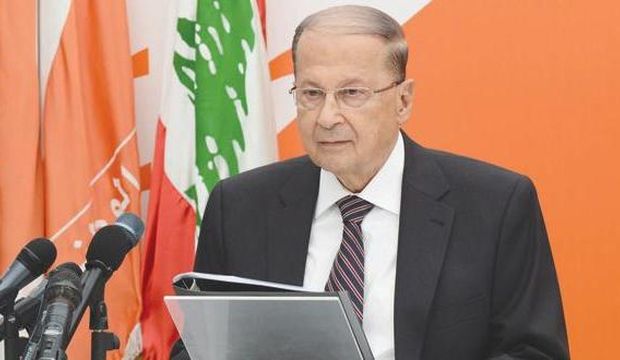Beirut, Asharq Al-Awsat—Michel Aoun, one of the contenders for the Lebanese Presidency, offered to withdraw from the race on Saturday, in return for changes to Lebanon’s electoral system.
Aoun, the leader of the Free Patriotic Movement, said he was willing to withdraw his “right to the Presidency as a representative of the largest Christian bloc in parliament,” in exchange for the introduction of a law changing the way parliamentary elections are held.
The Lebanese Presidency, traditionally reserved for a member of the country’s Maronite Christian community, has been vacant since the last president’s term expired at the end of May.
The country’s Christian parties, split between different political blocs, have been unable to agree on a single candidate, leading to months of deadlock.
The legislation favored by Aoun, known as the Orthodox Gathering Law, was originally proposed in 2013 and would change the voting system so that MPs voted exclusively for representatives of their sect, and on a national basis rather than in individual constituencies.
Aoun’s latest offer follows the failure of an earlier call for Lebanon’s president to be directly elected in two rounds, firstly among the country’s Christians, and then via a run-off in which the population as a whole participates.
Hikmat Deeb, an MP in Aoun’s Change and Reform parliamentary bloc, denied any suggestions that a deal was on offer.
He said what was suggested by Aoun’s Change and Reform bloc was a road map of two points: ratifying a new election law, and agreeing on the election of a person who enjoys popular representation and a sizable bloc in the Lebanese parliament.
He said: “Lebanon is currently the only country in the Middle East with a Christian president, and therefore, amid the dangerous developments in the region, most recently in Mosul, it has become our duty to hold on, more than at any time before, to the demand for the election of a strong president who is not affiliated to non-Christian blocs.”
The two other candidates, Samir Geagea and Henri Helou, have the backing of the Sunni-led March 14 alliance and the Druze Democratic Gathering bloc respectively, and remain in the running for the vacant post. Aoun, who has yet to officially declare himself a candidate, insists he will only run if he is guaranteed to win as a “consensus candidate.”
Meanwhile, the conflict between Aoun’s camp and Maronite patriarch, Bechara Boutros Al-Rahi, has worsened with Rahi’s calls on MPs to attend parliamentary sessions to elect a president.
Aoun’s followers and members of the March 8 Alliance have boycotted several parliamentary sessions where a vote on electing a president was scheduled, leaving the body unable to form a quorum.
Ziad Aswad, a member of Aoun’s bloc in parliament, denounced Rahi’s insistence on blaming the MPs for the failure to elect a president, as well as accusations that they were working for their own interests and for the benefit of parties with foreign links.
Addressing Rahi, Aswad said: “You may be right, sir, in what you claim, but what remains is for you to name names because we do not accept such accusations from you as we are not shackled, weak, nor anyone’s agents; we have our [own] vision and decision.”
Aswad went on the blame the Lebanese political system for the deadlock, rather than the parties themselves.
Other attempts to break the recent deadlock have also been unsuccessful. The Future Movement, the driving force behind the March 14 alliance, has so far failed to find a mechanism to implement the road map recently proposed by its leader, Saad Al-Hariri, to resolve the deadlock and other related crises.
Meetings held last week by a senior member of the Future Movement, Fouad Siniora, with March 14 alliance figures including Kataeb (Phalangist) Party leader Amine Gemayel and leader of the Lebanese Forces Geagea, failed to arrive at a mechanism to implement the Hariri road map.
During a speech at an iftar banquet on Friday evening, Future Movement Secretary-General Ahmed Al-Hariri said the leader of the movement Saad Al-Hariri had “produced a road map for Lebanon where the priority was the election of a new president of the Republic as soon as possible.”
He said he hoped the road map would be met halfway “to save Lebanon from sedition and chaos, and from the disruptive Iranian policies implemented by Hezbollah,” which is a member of the rival March 8 alliance.


Trackbacks/Pingbacks